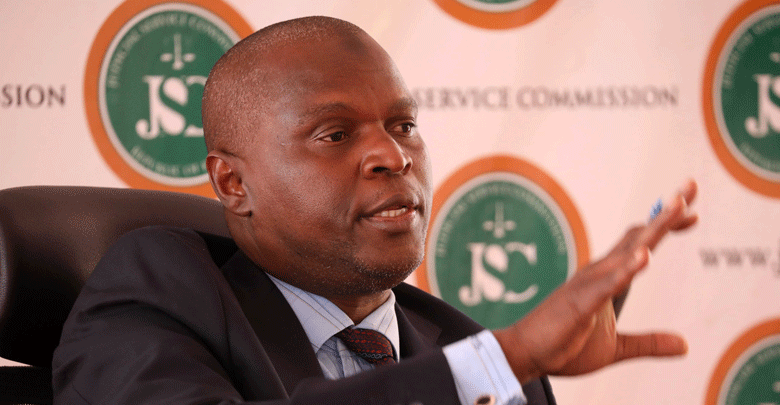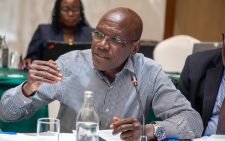Crying judge put to task over defilement case

Bernice Mbugua @BerniceMuhindi
High Court Judge Said Chitembwe yesterday stood by his decision to set free a 24-year-old man who had been convicted for defiling a 13-year-old girl.
Appearing before a Judicial Service Commission (JSC) panel during an interview for the Chief Justice (CJ) post, Justice Chitembwe said the ruling was based on the practicability of the issue more than the legal framework.
“I did my best to deal with the case at hand and I can tell you for sure that despite all these hullabaloos, the number of magistrates who called to say I freed them from the shackles of Sexual Offences Act are many,” Justice Chitembwe said.
His ruling was ranked the world’s worst ruling for women’s rights in 2016, and received the Golden Bludgeon.
The accused, Martin Charo, had been sentenced to 20 years in jail for having sex with the minor.
Chitembwe said the judge, the two had consensual sex, which should never be termed as defilement.
“The proceedings before the magistrate’s court, the complainant told the court that she went to this man’s house to have sex and then go home.
These were people who had been dating and even went to the parents’ home and slept there for three days… even the brothers knew where their sister was, so can you say because the law provides a minimum sentence, everybody should suffer the same fate irrespective of the circumstances?” posed the judge.
He argued that a judicial officer should look at the circumstances of the case.
Deputy Chief Justice Philomena Mwilu interrogated Chitembwe on what he was going to fix when appointed and how he was going to fix it as the President of the Supreme Court. But Chitembwe said he had nothing to fix since he had not been a Chief justice before.
Justice David Majanja, a commissioner in the panel, however, posited that the ruling was different from another decision which the judge had made, on the Council of Imams versus the Attorney General.
“There you were very clear that whatever the cultural religious issues, child marriage is illegal and cannot be permitted and in fact you were very firm there was no equivocation on your part,” said Majanja.
Justice Chitembwe, however, replied that those are two distinct cases, where the first case dealt with the defilement of a 13-year-old girl with a man they had been together for three years, while the second one was a deliberate act where a 16-year-old was forcefully married.
“I can smell defilement from far, the moment I read the charge sheet and analyse the evidence of the complainant I will know this is defilement,” he said.
“There are those grey areas where you can see should the law serve the society in this situation.”
During the interview, the judge became emotional, shedding tears, while explaining his experience when he was charged with a corruption case on embezzlement of funds at the National Social Security Fund (NSSF) when he was the company secretary.
Chitembwe was temporarily suspended from the Judiciary in 2010 after being charged with conspiracy to defraud NSSF Sh1.7 billion, but was later reinstated in 2011 after the anti-corruption court cleared him for lack of evidence.
“My personal experience is that we were two initially, me and the CEO. Two lawyers who were handling the transaction were later enjoined, they filed an application to stop the hearing of the criminal case and I had to go to the Court of Appeal because I was not involved in the application to be heard. I wanted the public to be told what I stole and what I took so that this issue is settled… The Court of Appeal agreed and we went back and we were heard,” an emotional Chitembwe told JSC.
The judge noted that 35 witnesses were called and he was cleared.
“This experience makes you know if an accused comes before you and raises his hand to hear him… The mandate of DPP as you seat as a judicial officer you should be able to sift out what has been brought for serving other purposes and what has been genuinely brought as a court case,” he told the panellists.
Chitembwe also told the panel that his experience had taught him that granting bail should not take long.
“I can’t understand why a court will take a whole month to grant or deny bail. You would rather deny that this party can go to another court. But If you take two weeks the spirit of the Constitution is that nobody should stay in… I agree there are those cases with compelling reasons,” he said.
He also said once appointed the CJ he would ensure regular training for judicial officers in order to maintain high moral standards and integrity.
On the issue of 41 judges who were appointed by the JSC but the President declined to endorse the move, Justice Chitembwe noted that JSC played a role in having the said problem as they let a vacancy of the said judges happen at once.
“You were here, you saw judges retiring, you saw judges promoted to other courts. Why couldn’t you have a system of promoting or recruiting like three four or five?” he posed. According to him, his solution would be to approach the Executive and negotiate on the matter.
“I would have to meet the President, to solve the problem… I cannot sit and swear in the judges even if the court orders me to swear them in, I will not, I am a man of principle, I have to follow the law so the law says it is the President who gazettes them and swears them in, that’s the law,” he said.
He said he would first let the ones with no issues to be sworn in.
On his weaknesses, the judge noted that he was too generous when it comes to sentencing.
“Having gone through the process… when I go to any court those in prison are very happy because they think they will get a moderate sentence,” he said.
The commission informed Chitembwe they had communication from KRA that he was not tax compliant. The judge, however, said his salary does not come to him.
“I can provide the bank statements, I don’t receive rental income myself… it goes to my wife and she deals with the KRA… but they could see electricity accounts that were in my name so I sat down with them for more than three times to clarify the matter,” he said.
Secretary to the JSC Anne Amadi, in a media briefing, yesterday, confirmed that all the nine commissioners will be present for the interviews despite former Director of Public Prosecutions, Philip Murgor, writing to the JSC requesting that Justice Mwilu be excused. Prof Patricia Kameri-Mbote will be interviewed today.







